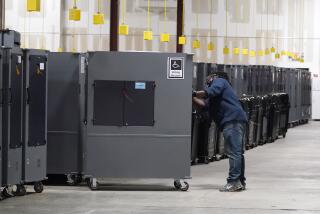Famed Hacker Is Indicted by U.S. Grand Jury
- Share via
A federal grand jury indicted famed computer hacker Kevin Mitnick on 25 counts Thursday, accusing him of stealing millions of dollars in software through an elaborate hacking spree during the more than two years that he was a fugitive before his capture last year in North Carolina.
The indictment alleges that the 33-year-old computer wizard broke into the systems of major software and communications companies, then transferred stolen material to computers at the University of Southern California via the Internet.
The indictments were based on the work of an unusual task force of high-tech sleuths, whose members included representatives of NASA and the Department of Justice, and illustrates a commitment by federal authorities to crack down on a growing breed of computer criminals, U.S. Atty. Nora M. Manella said.
“Computer and Internet crime represents a major threat, with sophisticated criminals able to wreak havoc around the world using a lone computer and a modem as their weapons of choice,” Manella said. “This indictment is a major step forward in the federal effort to track down and prosecute computer hackers.”
Mitnick has been in custody since February 1995 and is now in a federal jail in Los Angeles, awaiting sentencing on a cellular phone fraud charge.
Mitnick began his lengthy career as a hacker at Monroe High School in North Hills, where he broke into the computers of the Los Angeles Unified School District.
He evaded authorities in narrow escapes in Los Angeles and Seattle over 2 1/2 years, becoming an anti-authority hero in the world of renegade hackers.
To catch the man who used the code name “Condor,” the government brought in computer security expert Tsutomu Shimomura of the San Diego Supercomputer Center, who helped track Mitnick to an apartment in Raleigh, N.C.
Mitnick pleaded guilty in April to one federal count of cellular phone fraud and admitted to violating terms of his probation on an earlier computer-fraud conviction.
In return for his plea, federal prosecutors in Los Angeles agreed to drop 22 other fraud charges--brought in an indictment handed down against Mitnick in Raleigh--but warned at the time that charges on “far more serious” offenses could follow.
Thursday’s indictment also charges Lewis De Payne, a 36-year-old resident of Northern California, with helping Mitnick carry out the scheme. De Payne has arranged through his attorney to surrender today to federal authorities in Los Angeles.
“Mr. De Payne feels wronged. . . . [He] has expressed a feeling that the government’s agenda is something other than what it’s supposed to be and that he’s done nothing to be ashamed of,” said Richard Sherman, De Payne’s attorney.
An attorney for Mitnick could not be reached for comment Thursday.
The indictment charges Mitnick with 14 counts of wire fraud for his alleged systematic theft of proprietary software from manufacturers, including Motorola Inc., Nokia Mobile Phones Ltd., Fujitsu Ltd., Novell Inc. and NEC Ltd.
Mitnick is also charged with damaging computers at USC, stealing and compiling numerous electronic files containing user names and corresponding passwords and attacking computer systems belonging to Internet service providers.
According to the indictment, Mitnick and De Payne gained user accounts and passwords to some of the companies by pretending to be employees. In some instances, Mitnick would pose as an employee working on a special project to deceive computer personnel into creating a new user account on the company’s computer, the indictment alleged.
Once he gained access, Mitnick allegedly ran unauthorized “hacking” programs on computers belonging to some of the companies, Internet service providers and educational institutions. The programs enabled Mitnick to obtain “superuser” status, giving him access to all areas of a computer, to copy, misappropriate and transfer computer software, E-mail, passwords and personal information about a company’s personnel, the indictment alleged.
In one instance, Mitnick is accused of electronically transferring Novell’s proprietary software without authorization through Colorado SuperNet, an Internet service provider based in Denver, to computers at USC. Three months later, in May 1994, Mitnick again electronically transferred NEC proprietary software without authorization from Irving, Texas, to USC, according to the indictment.
The indictment did not explain why he used USC computers as a storage point, and did not specify the value of the stolen programs beyond “millions of dollars.” It does not accuse him of selling the material.
De Payne, a friend of Mitnick’s since the two were teenagers, allegedly aided Mitnick by providing him with cellular phones and programming them with stolen electronic serial numbers and mobile identification numbers, according to Assistant U.S. Atty. David J. Schindler.
The indictment alleges that Mitnick and De Payne tried to cover their tracks by using the “cloned” cellular phones to make computer connections they considered untraceable, by using aliases and by disabling computer audit programs and logs, the indictment alleges.
Schindler said he anticipates that Mitnick and Depayne will be arraigned Monday.
More to Read
Sign up for Essential California
The most important California stories and recommendations in your inbox every morning.
You may occasionally receive promotional content from the Los Angeles Times.













